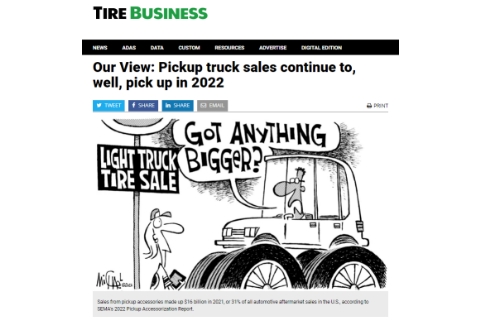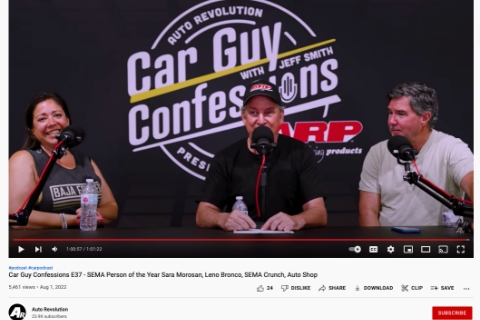SEMA News - May 2009
Media’s Interest in Legislation...
…and the Potential Opportunity This Presents to Local Businesses
Each day, new laws are being considered that may significantly impact your business. In addition to making your voice heard with elected officials, you can use pending legislation as a timely news hook to position yourself as an expert resource with the local media.
Stories that deal with exhaust-noise issues, street-rod titling or old-car scrappage schemes are likely to be of interest to reporters in your hometown. As an established business person, you serve a valuable role for the media and can help advance the industry’s position on these issues while also generating positive coverage for your company.
The first step in this effort is to get involved. Join the SEMA Action Network (SAN). Since its inception in 1997, the SAN has become a potent force in advocating on behalf of the automotive community. Membership is free and provides timely action alerts regarding hobby and industry-related legislation. The alerts include simple, easy-to-read notices with tips on how to communicate with elected officials.
Even industry expert Rob Kinnan, editor of Hot Rod magazine, is a SAN member and encourages his readers to join. Visit www.semasan.com to join and learn more about the program.
SAN alerts are tailored to businesses and enthusiasts and can help industry professionals such as you further your media-relations efforts. Here are just a few easy tips:
Develop a relationship. Read your local newspaper, and watch your local news stations. If a story has already been written about proposed legislation, send the reporter a note acknowledging the story. Commend the reporter if the story has touched on the industry’s key points, and educate the reporter on the “opposing” side of the story if it was not mentioned. The note will allow you to serve as a friendly resource and aid in building and maintaining a positive relationship with the local media.
Submit a Letter to the Editor. Draft a formal letter to the editor. Most newspapers have a section where they print letters from readers regarding articles that have appeared. To increase the likelihood that your letter will be published, inquire about any guidelines in advance. Word counts and formats vary from publication to publication.
Consider a pitch. If you find that your local media has not reported on an issue, pitch the story to them. Use the legislative alert and key message points provided by SAN as the basis for the pitch. Be sure to review the legislative alert carefully, and be prepared for the reporter to ask about the opposing viewpoint. Also, be strategic about who you decide to pitch. Research previous stories covered and be familiar with the reporter’s writing style. Steer clear of anyone who may be controversial.
Be resourceful. As you communicate with the media on these issues, remember to position yourself as a resource. You can do more than assist as a local industry expert. If you have eye-catching project vehicles or a shop filled with accessories, you can offer your store as a location for television interviews. You can also utilize SEMA and direct reporters to the association, if they are looking for a national spokesperson, seeking research or searching for trend information.
Utilize SEMA. SEMA members can contact the association’s public relations department for help and information on how to work with local media and generate a public relations plan. To learn more, e-mail: pr@sema.org.
 | Aftermarket News—February 2009 SEMA recently successfully opposed a “Cash for Clunkers” bill that would have given a cash voucher to purchase a newer vehicle to any person who traded in an older car. This was a key federal issue, considered as part of the federal economic stimulus package. It was reported in newspapers across the country, including The Wall Street Journal and The New York Times. Most reporters are looking for local angles on this national story. This is where you come in. As a local business person and industry expert, a simple call or letter to your hometown newspaper would likely generate interest and additional calls. |
 | Aftermarket Business—February 2009 “SEMA Urges Action Against Oregon Bill That Prohibits Sale of Aftermarket Parts” The most important thing to do when an issue comes up in your state is to contact your local elected officials. But a story in the paper communicating the industry’s position is helpful, too, since it may spark hundreds of others to take action as well. When state issues arise, such as this one in Oregon, it’s an opportunity for businesses to take action. Use the same key messages from the SAN action alert to craft a letter to your newspapers and TV stations and encourage them to do a story on the issue. |
 | Hot Rod—January 2009 Hot Rod Editor Rob Kinnan recognizes the value of the SAN and encourages his readers to join the group. Members are alerted about pending bills that may impact the automotive hobby. |
 | TheCabin.Net —March 6, 2009 In the town of Conway, Arkansas, an ordinance was proposed that provided that “…no person shall park, store, leave or permit the parking, storing or leaving of any motor vehicle, and/or trailer of any kind, which is wrecked or inoperable, whether attended or not, upon any private property within the city…” and would consider any car left unattended after 72 hours as abandoned. News outlets in Arkansas, both print and TV, reported on this ordinance, giving local businesses a great opportunity to respond and develop a relationship with the reporters. |








